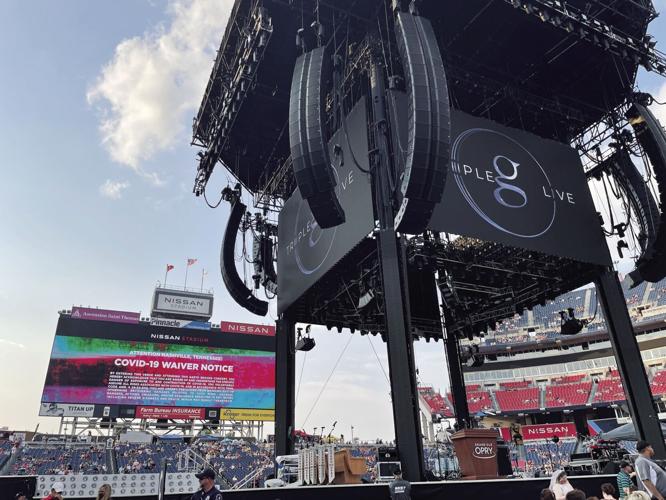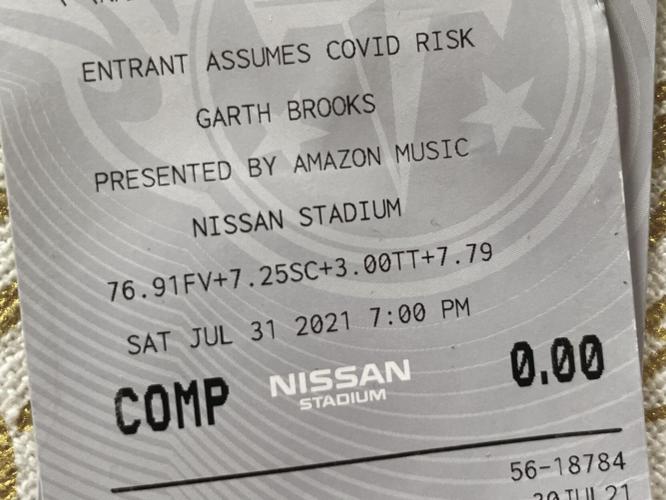
If you were one of the thousands of country fans who walked into Nissan Stadium for Garth Brooks’ concert on Saturday evening, you probably felt like you were living during pre-pandemic times. Brooks, one of the biggest country stars of the past three decades, was set to preview his fall stadium tour with a massive production that drew fans from hours away. He was to be one of the first artists to play to an audience in the stands at Music City’s football stadium, whose capacity for concerts is more than 50,000, since COVID-19 shut down the live entertainment industry in 2020. But Mother Nature had other plans: Thunderstorms forced the indefinite postponement of the show, while the crowd took shelter as best it could.
Tennessee Gov. Bill Lee hoped that the show would break an all-time attendance record for the stadium, saying in a statement that the event would “show the world that Nashville is open and country music is stronger than ever before.” Tourists streamed into the city, contributing to gnarly traffic jams on surrounding streets and filling up sidewalks. There were no COVID restrictions in place for the show — masks were optional and proof of vaccination was not required.
On that same day, Chicago welcomed around 100,000 concertgoers to Grant Park for Lollapalooza. The four-day festival didn’t allow patrons in without proof of vaccination or a negative COVID test result within 72 hours of entry, and unvaccinated fans were asked to wear masks at all times. Even though the festival’s standard has been criticized as being too lax, at least there was a standard. The stark contrast shows the mixed bag of strategies live music venues and events are using to navigate this transitional period, in which there are increasing concerns about the spread of the highly contagious Delta variant of the coronavirus. The Rolling Loud festival, held in Florida in mid-July, also did not have any entry criteria in place; at press time, neither does Bonnaroo.
Inside Nissan Stadium, I rarely saw masks on either fans or staff. While fans were still filing in, a video announcement from Brooks played on the LCD screens. He asked concertgoers to avoid making people wearing masks feel “uncomfortable.” He then went on to ask mask-wearing fans to do the same to those not wearing masks, as the evening was meant to “unite” audiences rather than divide.
It might have been easier to appreciate Brooks’ message if there weren’t large signs at every turn, reminding fans of the COVID risk they were taking by attending the event. Rising numbers of COVID cases — frequently among unvaccinated individuals, while some fully vaccinated people have contracted the coronavirus — warrant unease about going into any large crowd right now. Inside the stadium, these conditions were pretty much impossible to ignore.

The concert kicked off under heavy skies with an abbreviated version of the Grand Ole Opry, emceed by announcer Bill Cody. Chris Young, whose star began its ascent in the Aughts, took the stage for a two-song set. Two legends followed: Emmylou Harris sang a duet version of “Strong Hand” with Trisha Yearwood, as lightning flashed behind them. Moments after the duo finished, concertgoers were asked to take shelter within the stadium concourses.
Thousands of fans piled inside partially enclosed breezeways, with hundreds more spilling out into the uncovered entry plazas. Many huddled in stairways and bathrooms, waiting for the threat to pass. Other fans stubbornly stayed in their seats until the last possible moment, unable to let go of their hope that the show they’d been waiting for so long would go on. At first, tweets from Nissan Stadium’s official account offered hope that the concert could be moved to Sunday night, but that option proved unfeasible; further tweets indicated that security and hospitality staffing shortages were partly to blame. A new date for the concert has not been announced.
I stayed in a cramped space with other fans for more than an hour-and-a-half, and from what I could tell, the same was true around the stadium. With no COVID protocol in effect, it is statistically likely that the virus was transmitted in some capacity. Here’s hoping that the health impact is minimal.
With all of this in mind, one question has to be asked. Was this effort to prove country music is “stronger than ever before” really worth the risk? Does the urge for country music to return to normality come from the need for community, or the comfort of pretending that major problems aren’t really there?
Another country concert in the city over the weekend served as an especially strong argument for the latter assessment. On Friday, country star Luke Bryan headlined a packed show at Bridgestone Arena that yielded its own controversial headlines. Among the evening’s special guests was Morgan Wallen, who was caught on film in February shouting a racist slur. Despite being suspended by his label and CMT — and regardless of a move by the Country Music Association that bars him from winning awards this year, though others can still win awards for their contributions to his work — his album Dangerous stayed atop the all-genre Billboard 200 chart for a record-setting 10 consecutive weeks. The album was identified in MRC Data’s 2021 U.S. Midyear Report (formerly the Nielsen Midyear Report) as the best-selling album of the year so far.
Wallen took a step out of the public eye, but he’s been on a PR tour of sorts in recent weeks. Last month, he made an appearance on Good Morning America. He said that he’d used the N-word “playfully” and acknowledged he hadn’t “really sat and thought about” how racism was an issue within country music. A few days before he played during Bryan’s show, Wallen’s official Twitter account liked a tweet from a fan, who accused Nashville’s NAACP president of being critical of Wallen’s GMA interview only “because she wants him to push her agenda.”
Wallen’s appearance at Bridgestone Arena was not just a quick cameo, but a theatrical welcome back. Introduced as a “good friend” by Jason Aldean, Wallen joined Aldean, Bryan and Florida Georgia Line’s Tyler Hubbard in throwing back a celebratory tequila shot and performed “More Than My Hometown,” the lead single from Dangerous. He introduced it as a song about “staying true to yourself,” noting “that’s been a really hard thing for me to do lately.”
Many country fans celebrated this as a moment of needed redemption and a welcome return to something approaching normal. But that perspective ignores the opportunity to make “normal” better than it was before. Much like a virus, racism itself isn’t tangible, though its effects are. And it’s easy to ignore if you simply choose not to look for it.
These two shows serve as a painful example of how determined the country music industry seems to be to live in the past. Whether it’s underplaying the risks of a global pandemic or choosing to ignore inequality while uplifting those who downplay the issue, this weekend Nashville served as a backdrop for a genre that feels increasingly out of touch.






